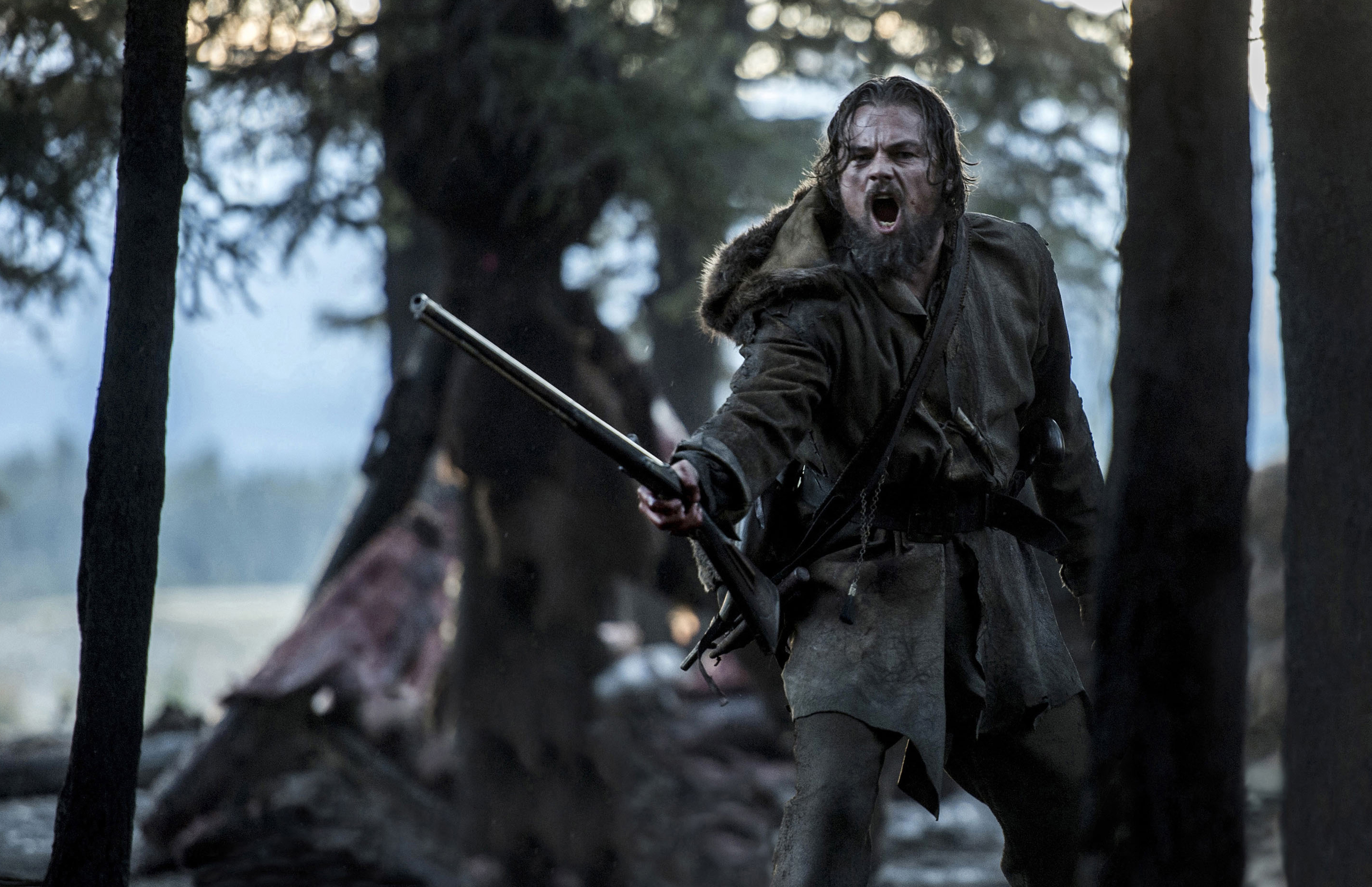How Spotlight, Room, and The Revenant confront the horrors of violence
A trio of Best Picture nominees remind us that violence is real, and it has consequences


A free daily email with the biggest news stories of the day – and the best features from TheWeek.com
You are now subscribed
Your newsletter sign-up was successful
The Revenant, Room, and Spotlight are each nominated for Best Picture at Sunday's 86th annual Academy Awards. But beyond that shared honor, these films might not seem like they have much in common. The Revenant is an epic about survival and retribution on the 19th-century American frontier. Room is an intimate drama about a mother and son held in captivity. Spotlight is a procedural about journalists investigating pedophilia in the Roman Catholic Church.
None of these movies could plausibly be labeled "light viewing." The Revenant, in particular, has been hyped for its ruthlessness: Battles, a bear mauling, and numerous other horrors are depicted in stomach-churning detail. Room and Spotlight are hardly less harrowing in subject matter; if anything, their contemporary settings and realistic styles make them harder to process.
Taken together, the movies offer a useful microcosm of the sheer variety of ways Hollywood can handle difficult subject matter — and the different messages about trauma that can follow.
The Week
Escape your echo chamber. Get the facts behind the news, plus analysis from multiple perspectives.

Sign up for The Week's Free Newsletters
From our morning news briefing to a weekly Good News Newsletter, get the best of The Week delivered directly to your inbox.
From our morning news briefing to a weekly Good News Newsletter, get the best of The Week delivered directly to your inbox.
The Revenant, Alejandro G. Iñárritu's fictionalized recounting of the near-fatal tussle between explorer Hugh Glass (Leonardo DiCaprio) and a grizzly bear wastes no time spilling blood. In the first scene after the title card, Arikara warriors attack Glass' expedition. Cinematographer Emmanuel Lubezki captures the ensuing mayhem in a series of long, fluid takes, wandering from one man to another as each is shot, skewered, bludgeoned, or otherwise felled. The grisly, heart-stopping spectacle sets the stage for the rest of the film, which consists largely of Glass dragging himself through the wintry South Dakota wilderness.
Unsurprisingly, The Revenant has inspired a fair amount of macho posturing. But those who treat The Revenant's graphic content like it's no big deal are actually missing the point: It's supposed to be repulsive, and to make the audience wince. It's a technique designed to immerse viewers in Glass' world and convey the pain he endures. All that violence is exhausting and ugly.
The Revenant never directly addresses the long-term emotional and psychological effects of violence; the characters are too preoccupied with staying alive, and even if they weren't, they aren't the kind of people prone to introspection. But that doesn't mean The Revenant has nothing to say about violence. The consequences don't need explication because they're visible. The maimed bodies and blood-stained snow highlight man's power, but also his fragility, showing how easily we can damage each other.
It's a message that provides an unlikely bridge to Room, which handles a similar theme in a far less graphic manner. Room, adapted from Emma Donoghue's 2010 novel of the same name, begins in a one-room shed where Joy (Brie Larson) and her five-year-old son, Jack (Jacob Tremblay), have been imprisoned for years by a man they call Old Nick (Sean Bridgers). For Jack, the room is everything he knows of the universe. He's only vaguely aware of the violence his mother endures, and as a result, so are we. When Old Nick sexually assaults Joy, it happens off-screen, marked by the bed creaks that Jack counts from the wardrobe where he's hiding.
A free daily email with the biggest news stories of the day – and the best features from TheWeek.com
The horrors are less immediate and visceral, which prevents the literal violence from overshadowing the emotional trauma. In most Hollywood productions, the escape would be happily ever after, but Room takes the time to explore the messy aftermath. Joy struggles to reconnect with other people, feeling isolated by her experiences and uncomfortable even in the familiarity of her childhood home, and Jack — shocked and unsettled by the enormity of the real world — bears the psychic scars of spending the first years of his life in confinement. Room, like The Revenant, is a kind of survivor's story. The key difference is that Room's survivors' humanity remains intact.
And that leads to Spotlight, which creates an even greater emotional distance: This time, the protagonists aren't the ones who endure the violence. Spotlight flouts the classic screenwriting maxim "show, don't tell," conveying the violence at the heart of its narrative through dialogue: a series of interviews between the Boston Globe Spotlight team and child abuse survivors. Director Tom McCarthy shoots these sessions the way a news broadcaster might, punctuating lingering shots of the subject's face with occasional cuts to interviewers' reactions. The camera — and, by extension, the audience — adopts the perspective of a detached observer, absorbing suffering secondhand.
Like Room, Spotlight is less interested in violence itself than the repercussions. The story takes place years, even decades, after the crimes were committed, but the survivors still display traces of trauma. One breaks into tears mid-interview, describing how his abuser exploited his homosexuality, and how his abuse eventually led to his own alcoholism. As the head of a victims' rights group explains, when a priest abuses a child, the harm isn't just physical but also spiritual: "He robs you of your faith."
But Spotlight, more than either The Revenant or Room, is dedicated to depicting the far-reaching consequences of violence. As the journalists delve deeper, they realize that this scandal transcends individual trauma, embroiling the whole city in a network of corruption: politicians, law firms, police, and even the media. There's something disconcerting about watching people in suits discuss child abuse in glass-encased offices or at formal parties, a reminder of how easily violence can be ignored and normalized, brushed under the rug of civility. Spotlight is never graphic, but it may have the most disturbing message of all: Individuals perpetrate violence, but society perpetuates it.
In an era of blockbusters that dispense bloodless, computer-generated destruction like candy, films such as The Revenant, Room, and Spotlight remind us that violence is real, and has real consequences. They may be tough to watch, but the stories they tell are vital.
Amy Woolsey is a freelance writer who recently graduated from George Mason University in Fairfax, Virginia. Her writing has appeared in the Mason student newspaper, Fourth Estate, and Bitch Flicks, a feminist pop culture website. She blogs about film and TV at theauramusings.wordpress.com.
-
 Health insurance: Premiums soar as ACA subsidies end
Health insurance: Premiums soar as ACA subsidies endFeature 1.4 million people have dropped coverage
-
 Anthropic: AI triggers the ‘SaaSpocalypse’
Anthropic: AI triggers the ‘SaaSpocalypse’Feature A grim reaper for software services?
-
 NIH director Bhattacharya tapped as acting CDC head
NIH director Bhattacharya tapped as acting CDC headSpeed Read Jay Bhattacharya, a critic of the CDC’s Covid-19 response, will now lead the Centers for Disease Control and Prevention
-
 Walter Isaacson's 'Elon Musk' can 'scarcely contain its subject'
Walter Isaacson's 'Elon Musk' can 'scarcely contain its subject'The latest biography on the elusive tech mogul is causing a stir among critics
-
 Welcome to the new TheWeek.com!
Welcome to the new TheWeek.com!The Explainer Please allow us to reintroduce ourselves
-
 The Oscars finale was a heartless disaster
The Oscars finale was a heartless disasterThe Explainer A calculated attempt at emotional manipulation goes very wrong
-
 Most awkward awards show ever?
Most awkward awards show ever?The Explainer The best, worst, and most shocking moments from a chaotic Golden Globes
-
 The possible silver lining to the Warner Bros. deal
The possible silver lining to the Warner Bros. dealThe Explainer Could what's terrible for theaters be good for creators?
-
 Jeffrey Wright is the new 'narrator voice'
Jeffrey Wright is the new 'narrator voice'The Explainer Move over, Sam Elliott and Morgan Freeman
-
 This week's literary events are the biggest award shows of 2020
This week's literary events are the biggest award shows of 2020feature So long, Oscar. Hello, Booker.
-
 What She Dies Tomorrow can teach us about our unshakable obsession with mortality
What She Dies Tomorrow can teach us about our unshakable obsession with mortalityThe Explainer This film isn't about the pandemic. But it can help viewers confront their fears about death.
